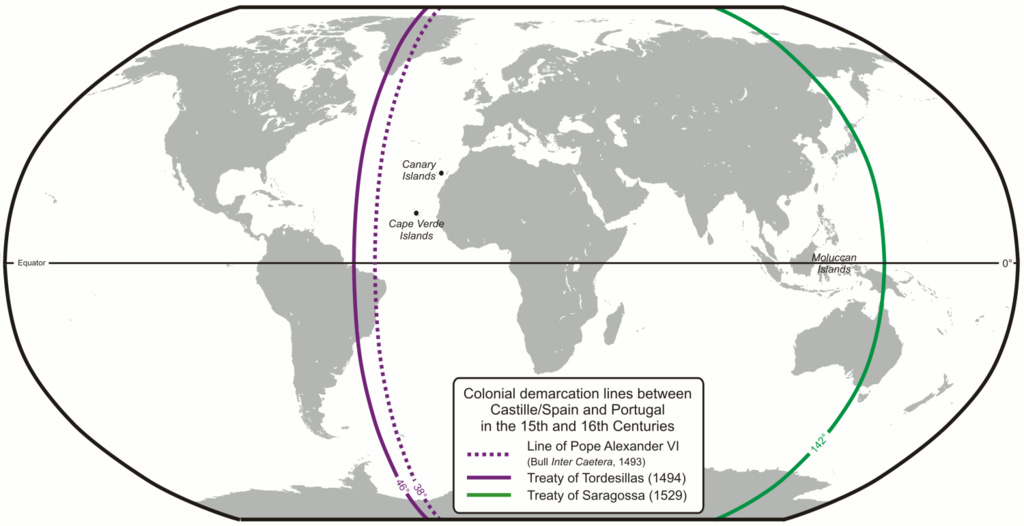A Whackadoodle History: Why Brazilians Don't Speak Spanish
"Why do the people in Brazil have Portuguese as their official language? Doesn't everyone in South America speak Spanish?"
“I don’t get why they need a Portuguese translator.” She was asking about the capture of convicted murderer Danelo Cavalcante after a fourteen day manhunt. “Isn’t he’s from Brazil?”
“Yes,” I nodded.
“Brazil is in South America. Don’t they all speak Spanish?”
I think that I snorted before answering. “It depends on which side of the meridian line their country lies on.”
“Huh?”
“Longitudes? Meridians? Lines drawn from pole to pole to aid in navigation and sometimes, as in this case, political disputes.”
“You still lost me.”
“They really don’t teach history in schools any more, do they?” I sighed in disgust.
“That’s why I have you,” she fluttered her eyelashes at me.
I snorted again, and began to explain. “As soon as Columbus returned to Spain with his famous “discovery”, merchants in Europe, including Portugal, were excited to follow. He described a new land full of new resources and new opportunities. This led to disputes as to whom this “new” land belonged. Certainly not to the people already living there. As they often did in those days, the rulers turned to their ultimate authority of God on earth, the Pope, to end the dispute. In 1493, Pope Alexander VI issued the Inter caetera—a papal bull that granted Spain’s monarchs all lands “west and south” of the meridian line located 100 leagues west and south of the Azores and Cape Verde.”
“So he just gave away land that wasn’t even his?”
“He gave away a continent without even knowing that it was a continent.” I replied. “But the answer to your question lies in where Pope Alexander VI drew the line. A slice of Brazil is east of that line, so Portuguese merchants set up ports there. They began trading with locals. They set up roots which began to grow.”
“So that’s why Brazilians speak Portuguese? Because of a Papal Bull?”
“Pretty much,” I said again. “It also explains why the British, French and Dutch all felt free to set up colonies in North America, well north of the Pope’s line. But that’s not the worst of his Papal Bull ruling.”
“What do you mean?”
“His Bull went on to say,” I pulled out my iPad because I wanted to get it perfectly.
Any land not inhabited by Christians was available to be "discovered," claimed, and exploited by Christian rulers and declared that "the Catholic faith and the Christian religion be exalted and be everywhere increased and spread, that the health of souls be cared for and that barbarous nations be overthrown and brought to the faith itself."
This "Doctrine of Discovery" became the basis of all European claims in the Americas (north and south) as well as the foundation for the United States’ western expansion. In the US Supreme Court in the 1823 case Johnson v. McIntosh, Chief Justice John Marshall’s opinion in the unanimous decision held "that the principle of discovery gave European nations an absolute right to New World lands."
Source: The Doctrine of Discovery, 1493 | Gilder Lehrman Institute of American History
“Any land not inhabited by Christians could be claimed by anyone Christian?” she echoed.
“Claimed by Christian rulers, and exploited by those rulers.” I clarified. “The continent of Africa was also not a Christian land, and it was also exploited. I’d mention the Pacific Islands, and Southeast Asia, but their exploitation came a few hundred years later. Hundreds of millions were, and are, exploited. I can’t help but wonder what Christ might have said.”
“What does exploited mean again” she asked suddenly.
I passed her my iPad, “Why don’t you look it up yourself?”




